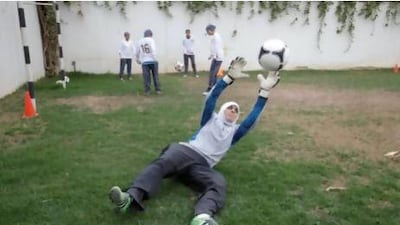New rules in Saudi Arabia allowing girls in private schools to participate in sport include regulations that could limit existing programmes.
Until now, private schools have been a safe haven for girls' sports. Many international schools have co-ed physical education classes as well as girls' leagues, and authorities have declined to regulate co-ed gym classes, even though all physical education for girls is prohibited in public schools.
But that could change after Saturday's announcement. The new rules state that physical education should comply with a fatwa issued by the grand mufti of Saudi Arabia, Sheikh Abdulaziz bin Baz, saying that women and girls can participate in sport or exercise as long as they do not mix with men or boys.
"All private schools need to provide appropriate locations" for sport, said Mohammed bin Saad Al Dhkina, the education ministry spokesman.
Girls will also be required to wear "decent dress" and to limit activities to those "appropriate to each age".
The education ministry's circular also called for Saudi women to be given priority as physical education instructors, Mr Al Dkhina said, part of a broader nationwide push to encourage Saudis to work in the private sector.
Some in physical education praised the move as a small step towards improving women's rights, while noting the hurdles the regulations created.
"Making standards that enhance safety and efficacy of physical education programmes are very important," said Professor Hazzaa Al Hazzaa, the director of the paediatric exercise physiology research laboratory at King Saud University. But he added that schools could face a "big shortage of qualified Saudi females who could be hired as physical education teachers".
If implemented, the new rules could also create logistical problems in private schools, where boys and girls often share facilities.
"We had girls' sports leagues for all the different sports, so there was a counterpart team for every boys' team, and the teams travelled together to tournaments," said Maya Itani, a former student who graduated from an American school in Khobar.
Women's sports in the kingdom became the subject of international controversy ahead of last year's London Olympics. Saudi Arabia sent its first two woman athletes to the games only after weeks of intense pressure from the International Olympic Committee.
But opportunities for women's or girls' sports are still limited. None of the 153 youth ministry-backed sports clubs has a girls' team.
In March, the education ministry said it was planning to introduce girls' physical education into public schools in accordance with Sharia, though it did not offer a timeline.
Public health experts said the need for physical education is urgent. Saudi Arabia has among the highest rates of inactivity in the world, contributing to rising rates of chronic diseases such as heart disease and diabetes. A study published last year in the Journal of Nutrition and Metabolism that found that the average Saudi's daily exertion "mimics the level of activity in adults 65 years of age or older".
Women face particular cultural and social hurdles to exercise.
"Saudi women have less opportunity to be physically active than men," said Dr Al Hazzaa. "We should, as society, find novel ways to provide the women with plenty of chances to be active through culturally appropriate programs and prospects."
edickinson@thenational.ae
twitter: For breaking news from the Gulf, the Middle East and around the globe follow The National World. Follow us

Saudi Arabian rules allowing girls to play sports could create more problems
By mandating boys and girls stay separate, the rules are creating logistical challenges for schools. Elizabeth Dickinson reports
Most popular today
7
